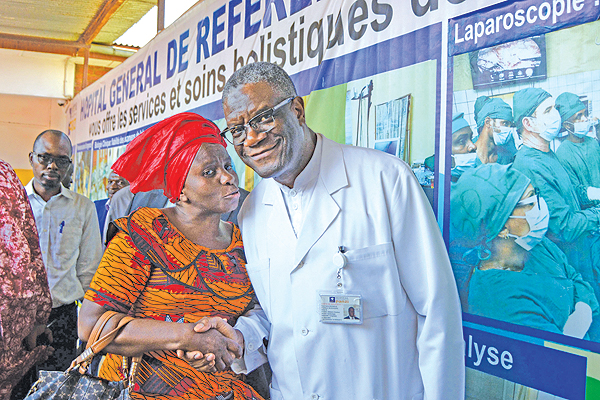‘When one does not fight against an evil, it is like a cancer’

KINSHASA: In the Democratic Republic of Congo, they call him "Doctor Miracle" for his surgical skill and dedication in helping women overcome the injuries and trauma of sexual abuse and rape. Denis Mukwege is a crusading gynecologist who has spent more than two decades treating appalling injuries inflicted on women in the DRC.
He has also emerged as an excoriating critic of President Joseph Kabila, set to be replaced in pivotal elections on December 23. A father of five, the tireless 63-year-old is an outspoken critic of the abuse of women in war and impunity for perpetrators. He has repeatedly accused the world of failing to act. "When one does not fight against an evil, it is like a cancer, it spreads and destroys the whole society," he told AFP in a weekend interview.
The 2018 Nobel Peace laureate, who shares the prize with Yazidi activist Nadia Murad, has dedicated his award to all victims of sexual violence. Mukwege's Panzi hospital has treated tens of thousands of victims of sexual violence in his war-weary native province of South Kivu, part of an eastern region riven by a conflict involving government forces and countless rebel groups. His work was the subject of an acclaimed 2015 film titled "The Man Who Mends Women".
"Denis Mukwege is the foremost, most unifying symbol, both nationally and internationally, of the struggle to end sexual violence in war and armed conflicts," Nobel committee chairwoman Berit Reiss-Andersen said when the award was announced in October. Mukwege resists talking of his work in terms of statistics, because "each woman raped is one woman too many," and he fears people have become desensitized to the swelling toll. But he said his hospital alone has treated more than 50,000 women and girls for injuries from sexual violence, while stressing that this is "just the tip of the iceberg".
'Atrocities on women's bodies'
In his French autobiography titled "Plaidoyer pour la Vie" (Plea for Life), Mukwege relates the "depths of horror" he encountered in South Kivu. Mukwege recounted how rapists had inserted a gun into a woman's vagina and fired. "Her whole pelvis was destroyed. I thought it was the work of a madman, but the same year I treated 45 similar cases," he said of the incident in 1999 -- the year he set up Panzi hospital in the provincial capital Bukavu.
"I have witnessed mass atrocities committed against women's bodies and I cannot remain with my arms folded because our common humanity calls on us to care for each other." The 450-bed Panzi hospital treats more than 3,500 women a year, though not all for sexual abuse. It provides free consultations and performs reconstructive surgery on women who have suffered serious internal injuries. Mukwege's work has also put his own life on the line. He narrowly escaped an attack in October 2012 in which his guard was killed. He now lives under the permanent protection of UN peacekeepers at his hospital.
Tireless campaigner
Aid agencies have accused all sides in the conflicts that have ravaged the eastern regions of North Kivu and South Kivu of using "systematic rape" against women as a weapon of war. Mukwege told AFP such attacks have increased since 2016 and more and more victims are children. Up to seven percent of rape victims at his hospital are now infants -- up from around three percent. "I believe that in my life I have never been as disturbed, shocked, I don't have the words. When you see an innocent little baby, but bloody, with her genitals shredded, you ask yourself questions about humanity.
"How could we get to this point? What happens to humans who have no rules? It has no limit." As well as his tireless medical work, Mukwege has fronted a worldwide campaign against trade in conflict diamonds and minerals. "The products of this looting, well we all have them in our pockets," he told reporters at a press conference on Sunday. "We all have a responsibility here." He expressed concern that this month's elections could spark further violence. DR Congo has not known a peaceful transition of power since gaining independence from Belgium in 1960. After Mukwege's Nobel award was announced, DR Congo authorities congratulated him for his "very important work", but accused him of mixing humanitarian work and politics.
Many awards
Born on March 1, 1955, in Bukavu, the third of nine children, Mukwege was inspired to become a doctor by his father, a pastor who used to visit the sick. After studying medicine in neighboring Burundi, he returned to work at Lemera hospital, south of Bukavu, before pursuing specialist training in gynaecology in France. Levi Luhiriri, who works as a doctor at the hospital, said Mukwege was fair but tough and strived for internationally recognised standards.
He has been honored by the United Nations and has received many other international awards, including the Olof Palme Prize in January 2009 and the Sakharov Prize in 2014. In September 2016, he also won the Seoul Peace Prize. Like with his other awards, Mukwege said his share of the Nobel Peace Prize money -- around half a million dollars -- will go to his Panzi Foundation. - AFP









